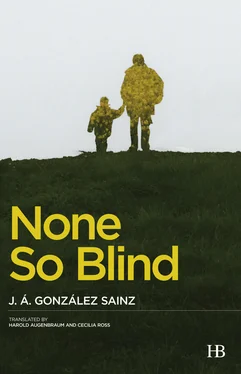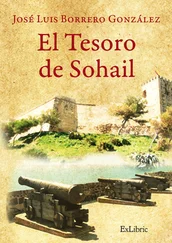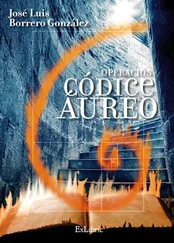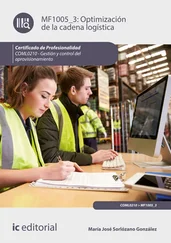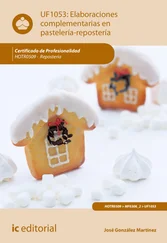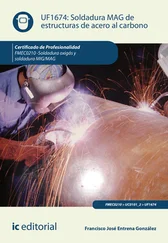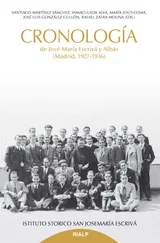And then, as the water heated in the pot, and once the onion was peeled, he removed the tips of the beans one by one, splitting them in half. Sometimes, as he cut them in two, the string from the pod would stick and come off on the knife, and he continued slowly tossing all of it, the peels and the scrapings from before and now the tips and the little strings from the tender beans, onto the unfolded pages of the newspaper that would eventually go, along with all the leavings, into the trash can. The bean tips fell steadily onto the paper a few seconds apart from one another with a flat sound, as if they were the first drops of a storm, and just as those drops slowly coat the ground, these, too, steadily came to cover the lines of text on the newspaper’s surface.
To him, all those sounds resonated as if something were working to amplify them or had set its mind to prolonging them. The snap of the potato, the tiny crinkling of the bean tips as they fell onto the paper — the drops of rain on the muffled dust of the road — or the flattened sound of the newspaper on the table. At one point, an especially long string from one of the beans he was cleaning stuck to the knife — we really are coming up to the end of the season, he thought — and after dropping it contemptuously onto the spread-out paper, he noticed that it had fallen in such a way as to underscore a line of text on the upper part of the open page.
Drawn by that unusual underlining — the little string had ended up positioned almost perfectly horizontally under the printing — he looked more carefully at the paper he had been planning on later throwing away with all the leavings inside, and suddenly, as soon as he read the first two words that were underlined the best, and, immediately afterward, the following ones, it seemed to him that the kitchen, that the whole world in which he was breathing, in an instant was empty of air. But it wasn’t only air that was suddenly missing, it was the floor, no longer solid, his blood, no longer flowing, the very thingness of things, their proximity, it was the dimension of space itself and the severe luminosity of light. As if everything around him had suddenly disappeared, been wiped out by a hurricane that had whisked it all at a single stroke into a state of the most indifferent insignificance, he was overwhelmed by a stupor the likes of which he believed he had never felt in his entire life, and which wasn’t really a stupor, nor was it mere disconcertedness or disorientation. It was a desire for that hurricane to whisk him away, as well, to yank him up and whisk him away to where all those other things had disappeared, so that he could disappear along with them.
Two last names, he saw the two last names and then four more words before the end of the paragraph, and above them, above what was doubtless the continuation of an article that began on a previous page, was a phrase in parentheses and italics that read, “Continued from page 1.” He read those six words, the four words plus the two last names, again and then again and then once more, and he didn’t know if it was in the hope that one of those times they might say something other than what they said, or perhaps out of an unconscious desire to wear them out, for them to become used up or faded, and for there not to be written there what neither his incredulity nor his helplessness could prevent from being written there.
Without daring at first to keep going, or daring to do anything, in fact — his heart was so clenched it seemed like it would explode — he quickly got up to look for the rest of the newspaper. He didn’t know where he could have left it after he’d pulled out the two middle pages; he didn’t know how to walk, he didn’t even know that things had to be in one particular place or that a single space could be so full of places, and the limp heaviness of his limbs astonished him, as did the fact that his eyes were used for seeing things and were not actually the things themselves.
But it had to be around there somewhere, it couldn’t have gone very far, if only, he managed to reason, because he hadn’t set foot outside the kitchen since his son had brought it in and left it lying there— ffflt , he recalled the sound again — right there on the table, so he couldn’t not find it, he couldn’t not go on scrambling around for it like a man possessed, in order to read, no matter what, that first page it said the line of text had come from. Though not exactly in order to read anything, in fact, or at least not right away, or to keep reading anything yet except the single first name that had been cut off and separated from the two last names at the beginning of the continuation of the article on the middle pages he was holding, to read it all together, one first name and two last names, and say it all together, confirming what he didn’t want to confirm no matter how much he already knew, and knowing what he wouldn’t ever have wanted to know no matter how many times he may have been able to sense it. It could still be a mistake, it could still be a coincidence, pure chance, they were two very common last names, after all!
He found the rest of the newspaper lying on the chair that was right in front of him, and without stopping to look at anything else, without even stopping to look at the most obvious things, the headlines and the photograph, he went straight to the last two words of the lead, front-page story. He read them once, and then he read them again, and again, looking away from the paper and then coming back to stare at the exact same spot where the two words were indelibly written. Juan José, it said clearly each time, and that’s where the text on the front page came to an end, the text of the article that then continued on the middle pages of the paper, beginning with those two last names, first Díaz and then García, and then, after a comma, after a comma grammarians would have called “explanatory,” the sentence reading,“who perpetrated the assassination.” It said “the assassination,” it said it again and again, no matter how many times he reread it hoping it would eventually say something else—“who perpetrated the assassination.”
It was hard to take in the fact that his son’s name had come to be present in a sentence like that, to be — as he had been taught in school — the subject of a predicate like that,“who perpetrated the assassination,”“who perpetrated the assassination,” or, more than hard, it was terrible in fact, the very core of terribleness, the scrapings of bitterness, as his father used to say, comparing things to fruit. His son, a murderer. His son, a murderer who has killed another person who is now no longer living and can never come back to life because his son, his own son, the fruit of his loins, has taken that person’s life — the thought pounded away in his brain again and again but with a sudden, ensuing sense of calmness, as if something, some scavenger, for instance, had just dived down and stripped him of his softest parts, his heart and his lungs and also his tongue and his eyes, and so he could finally finish reading with the empty sockets of his eyes, which were now incapable of shedding tears, and the empty space of his heart, which was now incapable of registering a single beat.
With the tentativeness of someone who is afraid of breaking something or afraid that the floor on which he is walking will fall away beneath him if he walks too fast, if he doesn’t take one step at a time, testing out the firmness of the pavement and the soundness of the road, he continued reading that paper he had been planning to roll up into a cone in a minute and throw into the trash along with all the leavings. “The person to whom investigators also impute,” he read,“two other assassinations, that of the aforementioned journalist and anti-Francoist fighter, and that of the young Guardia Civil member,” and following this, the latter’s two last names, the first of which was García, like his son’s, preceded by a first name he’d never heard prior to the years he’d spent walking along the highway with the metalworks and the tire retread shop after that.
Читать дальше
